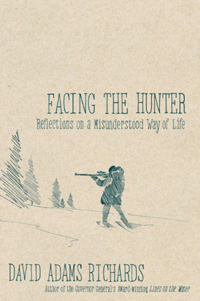Reviews
Nonfiction Review by David Leach
David Adams Richards, Facing the Hunter: Reflections on a Misunderstood Pursuit (Toronto: Doubleday, 2011). Hardcover, 214pp., $30.
I am, I fear, the kind of guy that David Adams Richards would hate: an urban-dwelling university professor, a self-proclaimed “progressive” (“such a damnable word,” laments Richards, in the opening salvo of his new work of nonfiction), whose greener-than-thou conscience starts at the Greenpeace pledge and stops at the recycling bin, whose outdoor know-how rests on the clay foundation of field guides, nature documentaries, and the occasional wilderness jaunt in the Gore-Texed guise of an “eco-tourist”—a word that likely infuriates Richards even more. My only consolation? At least I’m not the Chardonnay-sipping “neophyte poet” whose pontifications, at a party in Edmonton, about “how deplorable it was for men to work in the oil patch, to hunt with weapons, to kill the ecology we all must share” ignite, on page two, the fire that burns throughout Richards’ Facing the Hunter: Reflections on a Misunderstood Way of Life. The result is a sometimes angry, often nostalgic, and mostly engrossing defense of the working-class men (for they are almost all men) with whom the author once hunted and the wisdom they shared walking the forests of the Canadian Maritimes.
Guessing the identity of Richards’ poetic nemesis might make a fun parlour game for the literary in-crowd. But, like the other catalyst for this book—the federal Firearms Registry, created by the Liberals in 1993, killed by Stephen Harper’s Conservatives in 2012, and ground zero for a divisive culture war—the hot spark of Richard’s outrage soon cools and fades from vision. Within pages, Facing the Hunter cultivates a more contemplative tone. At the age of sixty, the acclaimed novelist—whose 1974 debut, The Coming of Winter, opens with a hunt gone awry— has hung up his rifle for the last time, at least as a serious hunter. Now, he wants to set into words “some of my story about how and why I hunted, long ago.”
Richards loosely frames his memories in thematic chapters: his initiation into the hunt; his family’s long heritage in the Maritime wilds; the difference between hunting deer or moose or ducks, or by canoe; getting lost, getting found; the eerie premonitions inspired by long immersions in the bush. But these themes are merely branches on which to hook passing thoughts; like a good campfire raconteur, Richards doesn’t feel constrained to the main trail of any one narrative. His stories drift across the decades and hunting seasons, pick up and say goodbye to various characters, and tease lessons from sticky situations he and his fellow hunters faced on the trail. Throughout, Richards speaks with an intimacy about the rivers and valleys of his native New Brunswick that will ring familiar to his readers. The repeated names cascade down the sinuous, yet assured, line of his neo-Biblical syntax and come to sound, in their resonant collision of vowels and consonants—Bartibog, Matapédia—like exotic realms of Middle Earth.
What rises into prominence is a rooted sense of place, an ecology deeper than any pamphlet-inspired philosophy, and a reminder that Richards has earned, through fourteen works of fiction (and four of nonfiction), his reputation as the Faulkner of the Miramichi not simply through the force of his imagination and verve of his prose, but thanks to an archaeological authority with dirt on its boots. He has walked stretches of his home province (as he admits, with hardly a hint of boasting) that probably never before felt the press of a human footprint. Not many of us can say that. Hunting has led him to such know - ledge. His defense of this way of life (for it remains more than mere “sport” in Richards’ mind) isn’t naïve or reactionary. He acknowledges the wasteful anti-authoritarianism of the poacher. He laments the hurried self-regard of high-rolling tourists who treat bush guides (like his grandfather) as hired peons and yokels, to be ignored when a trophy buck or moose rises into view. Richards admits that he himself “loved the hunt”—the setting, the solitude, the jolt of the first encounter—but “never thrilled at the killing.”
The book’s concatenation of anecdotes reminds even skeptical readers that hunting is both a moral act and a narrative art. The full experience of finding, felling, skinning, and eating a wild animal can inform what Aldo Leopold famously defined as a “land ethic”—the moral compact we make with the natural world around us. It certainly has for Richards. “It is a strange thing to say, an anomaly of conscience,” he writes, “but most hunters, most are conservationists. I will guarantee that I am.”
Ultimately, what remains for Richards after a life as a hunter (and among hunters) is a collection of stories, honed to a keen edge by latenight retellings, passed between the generations, with a common theme—“there is one way to do the right thing and a thousand ways to do it wrong.” It’s an insight as ancient as the painted caves of Lascaux, that early flourishing of narrative consciousness borne out of the primal experience of the hunt. Even wine-fond, city-bred poets (and other resistant readers) ought to pause before dismissing “hunting [as] a pariah worse than the dogs of war” and listen to the memories of a rare Canadian writer who has arrived at his own understanding of our ecological heritage—paradoxically, it might seem—with a gun in his hand.
—David Leach









